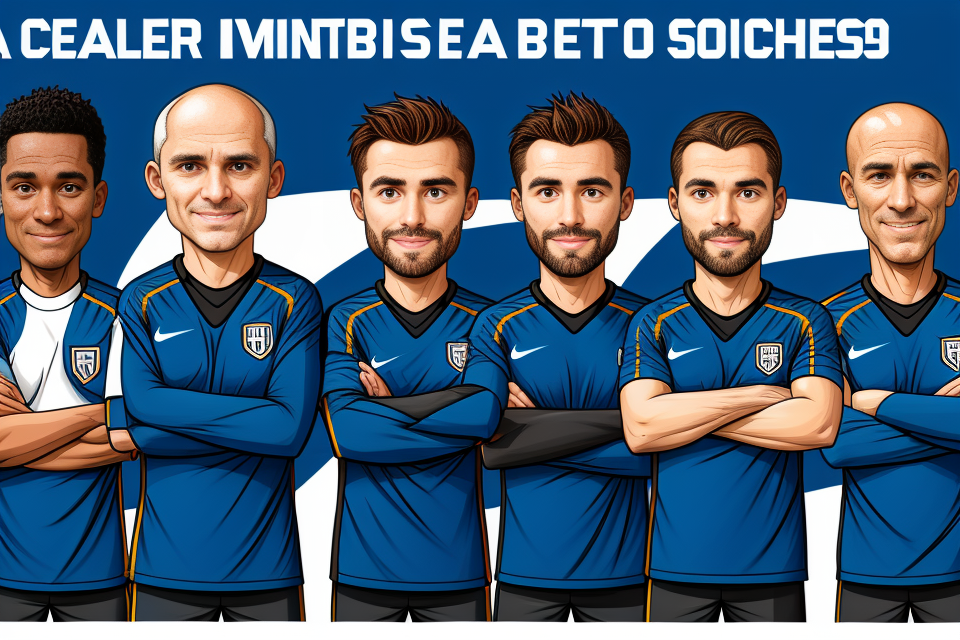Becoming a successful soccer coach requires dedication, passion, and a keen understanding of the game. It’s not just about teaching players how to kick a ball, but also about instilling discipline, teamwork, and a love for the sport. A good coach must have a solid knowledge of soccer strategies, tactics, and techniques, as well as the ability to motivate and inspire their players. In this article, we will explore the key elements of becoming a successful soccer coach, from developing your coaching philosophy to building a winning team culture. So, grab a ball and let’s get started!
To become a successful soccer coach, you should start by obtaining the necessary education and certifications. This could include earning a degree in sports science or a related field, as well as obtaining coaching licenses from organizations such as the United States Soccer Federation (USSF) or the National Soccer Coaches Association of America (NSCAA). Additionally, gaining experience by working as an assistant coach or volunteering with youth teams can be helpful in developing your skills and building your resume. It’s also important to stay up-to-date with the latest training techniques and strategies by attending coaching clinics and workshops, and to have strong communication and leadership skills to effectively work with players and parents. Finally, networking with other coaches and professionals in the sport can help you learn from others and gain valuable insight into the industry.
Develop Your Soccer Knowledge
Learn the Rules and Strategies of the Game
Understanding the Game
Soccer is a complex game that requires a deep understanding of its rules and strategies. To become a successful coach, it is essential to have a strong foundation of knowledge about the game.
Soccer Formations
A soccer formation refers to the arrangement of players on the field during a match. There are several common formations, such as the 4-4-2, 3-5-2, and 4-3-3. Understanding these formations and how they can be used to exploit an opponent’s weaknesses is crucial for any coach.
Offensive and Defensive Tactics
Offensive and defensive tactics refer to the strategies that a team uses to attack or defend the ball. These tactics can include things like through-balls, offensive runs, and offensive set pieces. It is important for a coach to understand how to use these tactics effectively and to also know how to defend against them.
Set Pieces
Set pieces refer to situations in which the ball is placed in a specific location on the field, such as a corner kick or a free kick. Understanding how to execute set pieces effectively can be the difference between winning and losing a match.
Learning from Experienced Coaches
One of the best ways to learn about soccer is to observe and learn from experienced coaches. This can include attending coaching courses and workshops, observing matches, and networking with other coaches. By learning from those who have already achieved success in the sport, you can gain valuable insights and techniques that can help you become a better coach.
Improve Your Communication Skills
Develop Effective Communication Strategies
Effective communication is crucial for any soccer coach. By developing clear and concise communication strategies, you can ensure that your players understand your expectations and are able to perform at their best.
Clear and Concise Messages
To develop effective communication strategies, it is important to focus on delivering clear and concise messages. This means using simple language and avoiding technical jargon that may confuse your players. When communicating with your players, it is important to be direct and specific about what you want them to do. For example, instead of saying “work harder,” you could say “increase your speed and endurance by running for an additional 10 minutes after practice.”
Positive Reinforcement
Positive reinforcement is another important aspect of effective communication. Encouragement and praise can help boost your players’ confidence and motivation. It is important to provide constructive feedback that highlights what your players are doing well, rather than focusing solely on their mistakes. This can help create a positive team culture and encourage players to continue improving.
Encouragement and Praise
Encouragement and praise can be as simple as acknowledging a player’s effort or achievement. For example, you could say “great job on that play, you made a great pass!” or “I appreciate your dedication to improving your skills.” These positive messages can help boost your players’ confidence and motivation.
Goal Setting
Goal setting is another effective communication strategy that can help your players achieve their full potential. By setting clear and achievable goals, you can help your players stay focused and motivated. It is important to involve your players in the goal-setting process and to ensure that the goals are specific, measurable, achievable, relevant, and time-bound (SMART). This can help your players feel a sense of ownership and responsibility for their goals.
By developing effective communication strategies, you can help your players understand your expectations and perform at their best. Clear and concise messages, positive reinforcement, and goal setting are all effective ways to communicate with your players and help them achieve their full potential.
Develop Your Leadership Skills
Establish a Clear Vision and Mission
Establishing a clear vision and mission is a crucial step in becoming a successful soccer coach. A vision is a long-term aspiration that provides direction and inspiration for the team, while a mission is a specific purpose that guides the team’s actions. Here are some key considerations for establishing a clear vision and mission:
Defining Your Coaching Philosophy
Your coaching philosophy is a set of beliefs and principles that guide your approach to coaching. It should reflect your values, priorities, and coaching style. To define your coaching philosophy, consider the following questions:
- What is your coaching style?
- What are your coaching goals?
- What values do you want to instill in your players?
- How do you want to help your players develop?
Once you have defined your coaching philosophy, you can use it to guide your decisions and actions as a coach.
Setting Goals and Objectives
Setting goals and objectives is an important part of establishing a clear vision and mission. Goals are specific, measurable, and time-bound targets that your team can work towards. Objectives are broader, long-term aspirations that provide a sense of direction and purpose. To set effective goals and objectives, consider the following:
- Be specific: Clearly define what you want to achieve.
- Be measurable: Establish criteria for measuring progress.
- Be time-bound: Set a deadline for achieving the goal or objective.
- Be realistic: Ensure that the goal or objective is achievable given your team’s resources and capabilities.
By setting clear goals and objectives, you can help your team stay focused and motivated.
Creating a Positive Team Culture
Creating a positive team culture is essential for building a successful soccer team. A positive team culture is one that fosters trust, respect, and cooperation among team members. To create a positive team culture, consider the following:
- Encourage open communication: Create an environment where players feel comfortable sharing their thoughts and ideas.
- Promote teamwork: Encourage players to work together and support each other.
- Foster a sense of belonging: Help players feel valued and included in the team.
- Celebrate successes: Recognize and celebrate the team’s achievements.
By creating a positive team culture, you can help your players feel motivated, engaged, and committed to the team’s success.
Manage and Lead Your Team
As a soccer coach, managing and leading your team is an essential aspect of your role. To become a successful soccer coach, you need to develop your leadership skills to ensure that your team performs at its best. Here are some ways to manage and lead your team effectively:
Building Rapport with Players
Building rapport with your players is crucial to ensure that they trust and respect you. As a coach, you need to establish a positive relationship with your players to create a conducive learning environment. To build rapport with your players, you can:
- Get to know your players personally
- Listen to their concerns and opinions
- Show empathy and understanding
- Be approachable and accessible
Delegating Tasks and Responsibilities
As a coach, you need to delegate tasks and responsibilities to your assistant coaches and team managers to ensure that your team runs smoothly. Delegating tasks can help you focus on your core responsibilities as a coach and help your team members develop their leadership skills. To delegate tasks effectively, you can:
- Clearly define the tasks and responsibilities
- Assign tasks based on strengths and weaknesses
- Provide clear instructions and expectations
- Establish a system of accountability and feedback
Handling Conflicts and Difficult Situations
As a coach, you will inevitably face conflicts and difficult situations with your players, parents, or other stakeholders. Handling these situations effectively requires strong leadership skills and a clear understanding of your team’s dynamics. To handle conflicts and difficult situations, you can:
- Stay calm and composed
- Communicate clearly and respectfully
- Listen actively and empathetically
- Seek input and feedback from all parties involved
- Find a mutually acceptable solution
By developing your leadership skills and effectively managing and leading your team, you can become a successful soccer coach and help your team achieve its goals.
Foster a Positive Learning Environment
Encourage a Growth Mindset
As a soccer coach, one of the most important things you can do to help your players reach their full potential is to encourage a growth mindset. This means creating an environment where players are encouraged to embrace challenges, persist through obstacles, and view setbacks as opportunities for growth. Here are some specific ways you can foster a growth mindset in your players:
Emphasizing Effort and Persistence
One of the key components of a growth mindset is the belief that effort and persistence are the keys to success. As a coach, you can emphasize this idea by celebrating players who work hard and persevere through tough times. You can also encourage players to set goals for themselves and to break those goals down into smaller, achievable steps. By doing so, you can help players understand that success is not just about natural talent, but also about putting in the necessary effort and staying committed to their goals.
Encouraging Risk-Taking and Experimentation
Another important aspect of a growth mindset is the willingness to take risks and try new things. As a coach, you can encourage this mindset by creating a safe and supportive environment where players feel comfortable trying new things and making mistakes. You can also encourage players to think creatively and to experiment with different strategies and techniques on the field. By doing so, you can help players develop the confidence and resilience they need to take risks and push themselves out of their comfort zones.
Overall, by emphasizing effort and persistence and encouraging risk-taking and experimentation, you can help your players develop a growth mindset that will serve them well both on and off the field.
Create a Supportive and Inclusive Environment
Creating a supportive and inclusive environment is crucial for the success of any soccer team. As a coach, it is your responsibility to ensure that every player feels valued, respected, and included in the team. Here are some ways to create a supportive and inclusive environment:
Valuing Diversity and Inclusion
Soccer teams are diverse, and as a coach, you should embrace this diversity. Every player brings their unique skills, experiences, and perspectives to the team, and it is important to value and celebrate these differences. By valuing diversity and inclusion, you can create a positive team culture where everyone feels welcome and included.
One way to value diversity and inclusion is to educate yourself and your players about different cultures, backgrounds, and experiences. You can organize team-building activities that promote understanding and appreciation of diversity, such as sharing personal stories, learning about different cultures, and participating in community events.
Encouraging Open Communication
Open communication is essential for a supportive and inclusive environment. As a coach, you should create an environment where players feel comfortable sharing their thoughts, concerns, and feedback. This can help build trust and respect among team members and foster a positive team culture.
To encourage open communication, you can establish clear communication channels, such as regular team meetings or one-on-one conversations. You can also encourage players to speak up and share their opinions, even if they disagree with yours. It is important to listen actively and respond constructively to player feedback, as this can help build trust and foster a positive team culture.
Additionally, you can create a safe space for players to share their experiences and concerns. This can be done by setting up a confidential hotline or email address where players can reach out to you with any issues or concerns. By creating a safe space for open communication, you can help build a supportive and inclusive environment where players feel comfortable expressing themselves.
Build Your Professional Network
Seek Out Mentors and Role Models
Learning from Successful Coaches
One of the most effective ways to become a successful soccer coach is to learn from those who have already achieved success in the field. Seek out coaches who have a proven track record of success, whether it be at the youth, college, or professional level. Observe their coaching styles, ask for advice, and learn from their experiences. This can be done by attending coaching clinics, watching games, and reading books and articles written by successful coaches.
Networking with Other Coaches and Professionals
Networking with other coaches and professionals in the soccer industry is another important aspect of becoming a successful coach. Attend coaching conventions, join coaching associations, and participate in online forums to connect with other coaches and professionals. Building relationships with others in the industry can lead to opportunities for learning, collaboration, and even job opportunities. Additionally, it’s important to be open to new ideas and perspectives, as these can help you to improve your coaching skills and techniques.
Continuously Develop Your Skills
Continuously developing your skills is crucial to becoming a successful soccer coach. To achieve this, consider the following steps:
Staying Up-to-Date with the Latest Coaching Techniques and Methods
Keeping abreast of the latest coaching techniques and methods is vital to maintaining a competitive edge. Attend workshops, conferences, and seminars to learn about the latest trends and advancements in soccer coaching. Engage in discussions with fellow coaches and experts to exchange ideas and knowledge.
Pursuing Advanced Coaching Certifications
Advanced coaching certifications, such as the UEFA Pro License or the FIFA Certification, demonstrate your commitment to the profession and enhance your credibility. These certifications provide in-depth knowledge of soccer tactics, training methods, and player development. They also offer valuable networking opportunities, allowing you to connect with other professionals in the field.
Engaging in Continuous Professional Development
Embrace a mindset of continuous learning and self-improvement. Actively seek out new information and resources, such as books, articles, and online courses, to expand your knowledge of soccer coaching. Regularly evaluate your coaching practices and reflect on areas for improvement. Engage in peer-to-peer learning by observing and providing feedback to other coaches, and ask for feedback on your own coaching practices. By continually developing your skills, you will be better equipped to help your players reach their full potential and achieve success on the field.
FAQs
1. What qualifications do I need to become a soccer coach?
To become a soccer coach, you typically need a strong knowledge of the game, experience playing or coaching at a high level, and relevant certifications. Many soccer organizations, such as the United States Soccer Federation (USSF), offer coaching licenses and certifications for aspiring coaches.
2. How can I gain experience coaching soccer?
One way to gain experience coaching soccer is to start by volunteering to coach youth teams or assist more experienced coaches. You can also take on coaching responsibilities for high school or college teams, or attend coaching clinics and workshops to improve your skills.
3. What are the key skills of a successful soccer coach?
A successful soccer coach should have strong leadership, communication, and organizational skills. They should also have a deep understanding of the game, including tactics, strategies, and techniques. Additionally, a successful coach should be able to motivate and inspire their players to reach their full potential.
4. How can I improve my knowledge of soccer tactics and strategies?
To improve your knowledge of soccer tactics and strategies, you can study the game closely, analyze match footage, and read books and articles on the subject. You can also attend coaching clinics and workshops, and network with other coaches to learn from their experiences.
5. How can I build a successful soccer team?
To build a successful soccer team, you need to focus on developing a strong team culture, establishing clear goals and expectations, and creating a training program that is tailored to the needs of your players. You should also foster a positive and supportive environment, and encourage open communication and feedback from your players.
6. How can I handle difficult situations as a soccer coach?
As a soccer coach, you may encounter difficult situations, such as conflicts among players or disagreements with parents. To handle these situations effectively, you should remain calm and professional, communicate clearly and openly, and work to find solutions that are fair and equitable for all parties involved.
7. How can I continue to develop as a soccer coach?
To continue to develop as a soccer coach, you should stay up-to-date with the latest coaching techniques and tactics, and seek out opportunities for professional development, such as attending coaching clinics and workshops, and networking with other coaches. You should also be open to feedback and willing to learn from your mistakes and failures.



